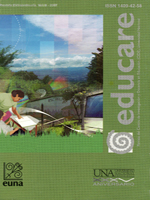Tecnologías de Información y Comunicación: el caso de las comunidades indígenas cabécares de Chirripó de Costa Rica
DOI:
https://doi.org/10.15359/ree.2-Ext.13Keywords:
informational technology, indigenous cultureAbstract
This article presents a software called "Cosmo vision and mother tongue Cabécar Course", which presents the world vision thorough the mother tongue of Costa Rican Cabecares indigenous communities located in Chirripó. Also shows that information and communication technologies are an opportunity to build a relation that allows intercultural coexistence and recognize the contribution to Costa Rican society of this human group.References
Barran tes, R. ( 1998). Origen y relaciones entre los Amerindios Chibcha de Costa
Rica: una perspectiva genética y evolutiva, p. 57. Primer congreso cientí
fico sobre pueblos indígenas de Costa Rica y sus fronteras, compiladoras:
María Eugenia Bozzoli, Ramiro Barrantes, Dinorah Obando y Mima Rojas:
UNICEF, UNED, UCR.
Bozzoli de Wille, M. E. (1986). El indígena costarricense y su ambiente natural:
usos y adaptaciones. San José, Costa Rica: Editorial Porvenir.
Ibarra, E. (1990). Las sociedades cacica/es de Costa Rica. San José: Editorial de la
Universidad de Costa Rica.
Mora, J. (2002). Proyecto de un nuevo Estatuto Indígena para Costa Rica: Experiencias
y Desafios. San José, OIT-Costa Rica.
Rodríguez, G. (2004). "Gobierno Electrónico: Hacia la Modernización y Transferencia
de la Gestión Pública". Revista de Derecho (21), 1-23.
Stone, D. (1952). Living Archeology of the Bribri and Cabecar Indians of Costa
Rica. Ponencia presentada en el 29 Congreso de Americanistas, Chicago.
Published
How to Cite
Issue
Section
License
1. In case the submitted paper is accepted for publication, the author(s) FREELY, COSTLESS, EXCLUSIVELY AND FOR AN INDEFINITE TERM transfer copyrights and patrimonial rights to Universidad Nacional (UNA, Costa Rica). For more details check the Originality Statement and Copyright Transfer Agreement
2. REUTILIZATION RIGHTS: UNA authorizes authors to use, for any purpose (among them selfarchiving or autoarchiving) and to publish in the Internet in any electronic site, the paper´'s final version, both approved and published (post print), as long as it is done with a non commercial purpose, does not generate derivates without previous consentment and recognizes both publisher's name and authorship.
3. The submission and possible publication of the paper in the Educare Electronic Journal is ruled by the Journal’s editorial policies, the institutional rules of Universidad Nacional and the laws of the Republic of Costa Rica. Additionally, any possible difference of opinion or future dispute shall be settled in accordance with the mechanisms of Alternative Dispute Resolution and the Costa Rican Jurisdiction.
4. In all cases, it is understood that the opinions issued are those of the authors and do not necessarily reflect the position and opinion of Educare, CIDE or Universidad Nacional, Costa Rica. It is also understood that, in the exercise of academic freedom, the authors have carried out a rogorous scientific-academic process of research, reflection and argumentation thar lays within the thematic scope of interest of the Journal.
5. The papers published by Educare Electronic Journal use a Creative Commons License:














 The articles published by Educare Electronic Journal can be shared with a Creative Commons License:
The articles published by Educare Electronic Journal can be shared with a Creative Commons License: 



